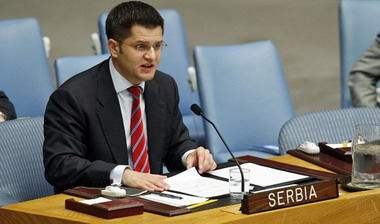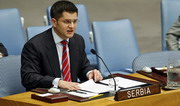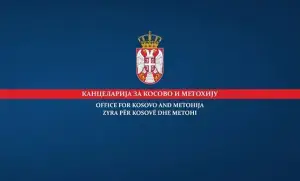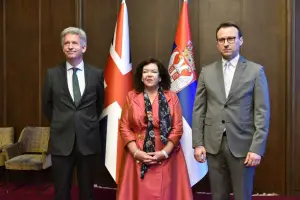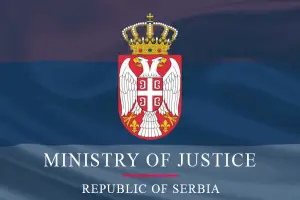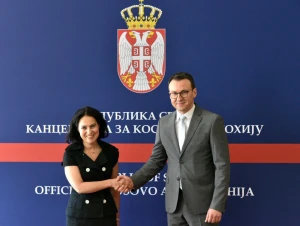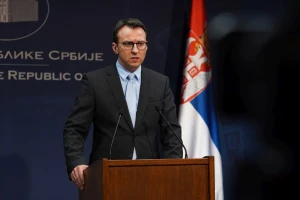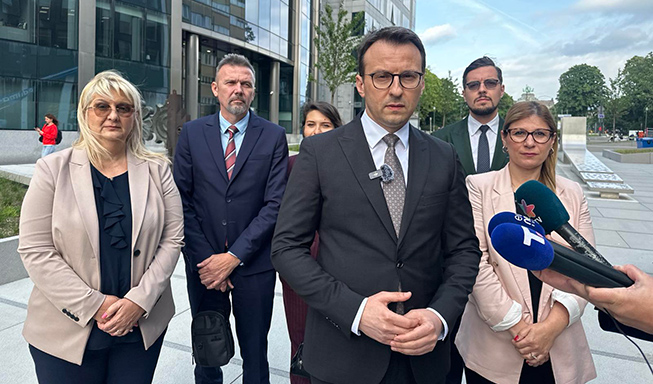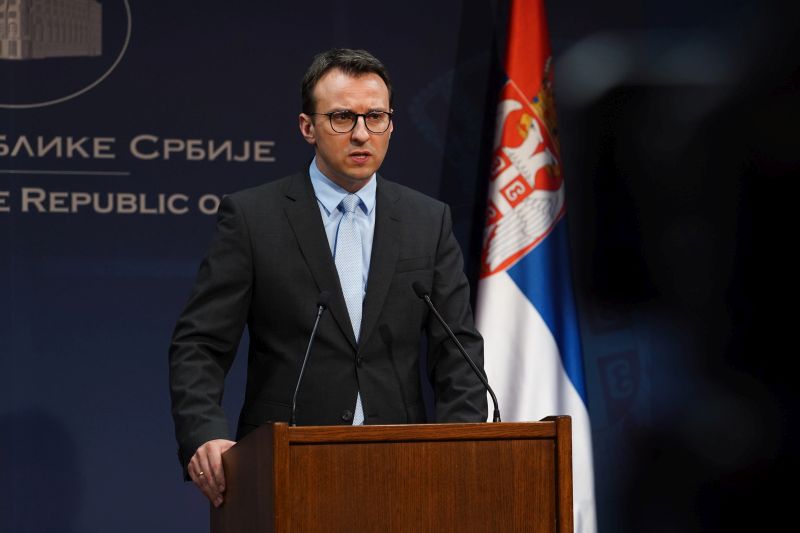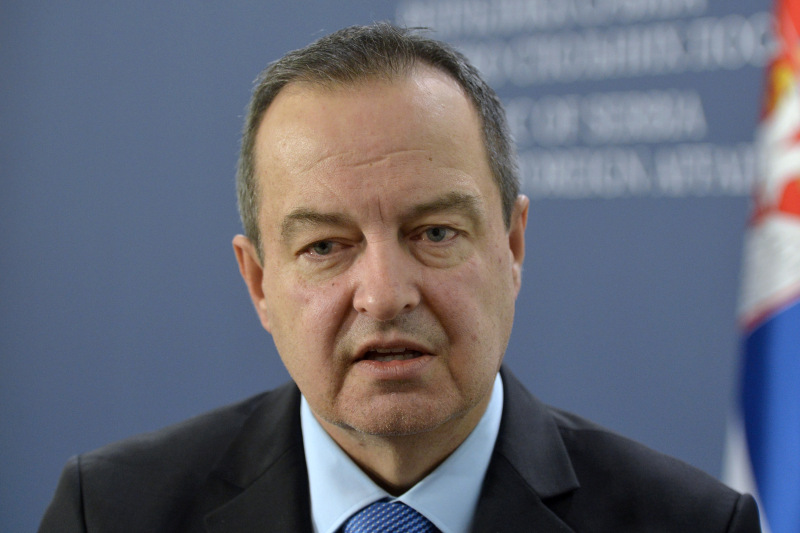Q:
A:
Serbia will continue defending Kosovo-Metohija by all available diplomatic means
Belgrade/New York,
3 August 2010
Minister of Foreign Affairs Vuk Jeremic said at the UN headquarters in New York tonight that the role of UN Security Council Resolution 1244 remains crucial to solving the issue of Kosovo-Metohija, for which there is no ideal solution, but a just one can be found.
At a session of the UN Security Council, the first after the announcement of the International Court of Justice’s opinion on the legality of the province’s unilaterally declared independence, Jeremic called upon UN member states that did not recognise Kosovo to adhere to their original stance.
There is no ideal solution, but a just one must be found, one over which we could all agree and which could push us forward, secure a consolidation of gains which the region has achieved over the past ten years. We will continue working incessantly until a compromise for Kosovo-Metohija is found, Jeremic declared.
He reiterated that Serbia is firmly committed to EU membership, noting that this goal will remain its central strategic priority, in addition it desires no confrontation with anyone, but it will not give in.
There is no doubt – we will not give in and simply withdraw. This is not about being stubborn, or about revisionism or a desire to be unpleasant. This is about the fact that we do not have any other choice but to persevere in a peaceful and dignified way, because Kosovo-Metohija is woven into the very essence of our identity, Jeremic highlighted.
He observed that any outcome which leads to one side getting everything and the other one losing all it has is, in fact, insecure.
Attempts to impose unilateral solutions have never brought stability to the Balkans or the rest of Europe. History is clear on this point: long-term solutions were never a result of coercion and they always required unanimous approval, he maintained.
The Minister stressed that this is why it is highly unlikely that the unilateral declaration of independence by Kosovo could ever become a basis for normalising the relations between Serbs and Albanians.
Permanent prosperity will be attained only after everyone has agreed that the defeat of one side means a loss to everyone, he noted.
Jeremic also voiced his belief that the upcoming debate at the UN General Assembly will be an opportunity for UN members to stand unanimous about a clear and decisive message that will disable the creation of a basis for a universally applicable precedent, a model for unilateral secession.
The Minister explained that Serbia will continue using all available diplomatic means in order to prevent any attempts at violent alteration of borders, reiterating Serbia’s stance that never and under no circumstances will it recognise the unilaterally declared independence of Kosovo-Metohija.
This is our constitutional imperative, our political and moral duty, based on the democratic will of a majority of our citizens, Jeremic declared.
He noted that no peace loving and proud people, faced with such a threat – whether it were an African, European, Asian or American country, small or large, rich or poor, would act differently.
A considerable majority of UN countries, including the ones sitting in the Security Council, respect Serbia’s sovereignty and territorial integrity. On behalf of my people, I would like to express our deepest gratitude for their support and solidarity. I also appeal to them to hold on to their principled position and not recognise Kosovo, Jeremic stated.
Speaking about the advisory opinion of the International Court of Justice (ICJ) in The Hague, which declared that Kosovo’s declaration of independence is not in contravention of international law, Jeremic noted that the court apparently decided to deal with the language of the independence declaration.
This strictly technical approach enabled the court to state an opinion, saying that the declaration does not violate international law. Unfortunately, this has left room for dangerous misinterpretations and thus legalised the attempt at unilateral secession, the Minister warned.
The court’s opinion affirmed UN Security Council Resolution 1244 and the activities of the UN in the southern Serbian province, he added.
The Minister pointed out that the ICJ did not accept the stance that Kosovo’s unilateral declaration of independence is a unique case, or Pristina’s stance that Kosovo is a state.
Finally, the ICJ did not sanction Kosovo’s right to secession or the right of Kosovo Albanians to self-determination. Nothing in the court’s advisory opinion changes the fundamental parameters of Resolution 1244, the central role of which remains supreme in the process of resolving the Kosovo issue in line with the primary responsibility of this institution, and that is to ensure peace and stability, as is laid out in the UN Charter, Jeremic maintained.
He warned that these misinterpretations of the ICJ’s opinion can cause far-reaching consequences for the international community.
Citing the words of UN Secretary general Ban Ki-moon that the UN General Assembly will have to decide how to proceed with this issue, Jeremic recalled that after the announcement of the ICJ’s opinion, Serbia submitted a proposed resolution, noting that the upcoming debate at the UN will undoubtedly focus on the consequences of Kosovo’s independence in light of the court’s opinion.
UN members will have an opportunity to give a crucial contribution to global management by becoming united around a clear and decisive message. Otherwise, a foundation will be created for establishing a universally applicable precedent which provides a model for unilateral secession, Jeremic stated.
The Minister recalled that the UN mission still remains an indispensable player in the southern Serbian province, noting that the status-neutral principle of the UN mission, as well as EULEX and the OSCE missions, is a framework enabling cooperation with the aim of improving the lives of ordinary people in the province, regardless of their ethnicity.
There is no ideal solution, but a just one must be found, one over which we could all agree and which could push us forward, secure a consolidation of gains which the region has achieved over the past ten years. We will continue working incessantly until a compromise for Kosovo-Metohija is found, Jeremic declared.
He reiterated that Serbia is firmly committed to EU membership, noting that this goal will remain its central strategic priority, in addition it desires no confrontation with anyone, but it will not give in.
There is no doubt – we will not give in and simply withdraw. This is not about being stubborn, or about revisionism or a desire to be unpleasant. This is about the fact that we do not have any other choice but to persevere in a peaceful and dignified way, because Kosovo-Metohija is woven into the very essence of our identity, Jeremic highlighted.
He observed that any outcome which leads to one side getting everything and the other one losing all it has is, in fact, insecure.
Attempts to impose unilateral solutions have never brought stability to the Balkans or the rest of Europe. History is clear on this point: long-term solutions were never a result of coercion and they always required unanimous approval, he maintained.
The Minister stressed that this is why it is highly unlikely that the unilateral declaration of independence by Kosovo could ever become a basis for normalising the relations between Serbs and Albanians.
Permanent prosperity will be attained only after everyone has agreed that the defeat of one side means a loss to everyone, he noted.
Jeremic also voiced his belief that the upcoming debate at the UN General Assembly will be an opportunity for UN members to stand unanimous about a clear and decisive message that will disable the creation of a basis for a universally applicable precedent, a model for unilateral secession.
The Minister explained that Serbia will continue using all available diplomatic means in order to prevent any attempts at violent alteration of borders, reiterating Serbia’s stance that never and under no circumstances will it recognise the unilaterally declared independence of Kosovo-Metohija.
This is our constitutional imperative, our political and moral duty, based on the democratic will of a majority of our citizens, Jeremic declared.
He noted that no peace loving and proud people, faced with such a threat – whether it were an African, European, Asian or American country, small or large, rich or poor, would act differently.
A considerable majority of UN countries, including the ones sitting in the Security Council, respect Serbia’s sovereignty and territorial integrity. On behalf of my people, I would like to express our deepest gratitude for their support and solidarity. I also appeal to them to hold on to their principled position and not recognise Kosovo, Jeremic stated.
Speaking about the advisory opinion of the International Court of Justice (ICJ) in The Hague, which declared that Kosovo’s declaration of independence is not in contravention of international law, Jeremic noted that the court apparently decided to deal with the language of the independence declaration.
This strictly technical approach enabled the court to state an opinion, saying that the declaration does not violate international law. Unfortunately, this has left room for dangerous misinterpretations and thus legalised the attempt at unilateral secession, the Minister warned.
The court’s opinion affirmed UN Security Council Resolution 1244 and the activities of the UN in the southern Serbian province, he added.
The Minister pointed out that the ICJ did not accept the stance that Kosovo’s unilateral declaration of independence is a unique case, or Pristina’s stance that Kosovo is a state.
Finally, the ICJ did not sanction Kosovo’s right to secession or the right of Kosovo Albanians to self-determination. Nothing in the court’s advisory opinion changes the fundamental parameters of Resolution 1244, the central role of which remains supreme in the process of resolving the Kosovo issue in line with the primary responsibility of this institution, and that is to ensure peace and stability, as is laid out in the UN Charter, Jeremic maintained.
He warned that these misinterpretations of the ICJ’s opinion can cause far-reaching consequences for the international community.
Citing the words of UN Secretary general Ban Ki-moon that the UN General Assembly will have to decide how to proceed with this issue, Jeremic recalled that after the announcement of the ICJ’s opinion, Serbia submitted a proposed resolution, noting that the upcoming debate at the UN will undoubtedly focus on the consequences of Kosovo’s independence in light of the court’s opinion.
UN members will have an opportunity to give a crucial contribution to global management by becoming united around a clear and decisive message. Otherwise, a foundation will be created for establishing a universally applicable precedent which provides a model for unilateral secession, Jeremic stated.
The Minister recalled that the UN mission still remains an indispensable player in the southern Serbian province, noting that the status-neutral principle of the UN mission, as well as EULEX and the OSCE missions, is a framework enabling cooperation with the aim of improving the lives of ordinary people in the province, regardless of their ethnicity.

